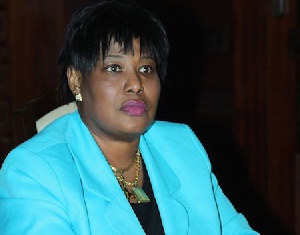 Nana Yaa Jantuah, Public Affairs Director- PURC
Nana Yaa Jantuah, Public Affairs Director- PURC
The Public Utilities Regulatory Commission (PURC) says any request for tariff hike by utilities will be bench marked against their performance.
“There has to be some improvement in the system; if we do not see any improvement in the system certainly we are not going to pass on new increases,” the Public Affairs Director of PURC, Nana Yaa Jantuah said.
The Commission is to hold a major tariff review consultation with utility providers and other stakeholders this week. “We are going to interrogate proposals, do stakeholder consultations, public hearings, and take inputs from them, so this is a bigger thing,” she said.
She explained that the upcoming tariff review is a bigger review process than the Automatic Adjustment Formula. Any such review is expected to take into consideration the price or cost of the new generation coming on-stream.
The country has currently increased its thermal power generation to bridge the shortfall in hydro-power generation due largely to poor water inflow into the Akosombo reservoir. Delay of rain fall in the northern part of the country has been the main cause.
Emergency power barges from Turkey and Dubai are expected to arrive in the country by September to ease the current power rationing regime.
“It is contingent on the fact that these plants will come, and if these plants are not here certainly there can be no increase; the arrival of these plants is going to be a panacea for what we are experiencing now,” Ms Jantuah added.
The Power Ministry says although government will also be absorbing some of the cost to operate the barges, the public must brace for increased cost of power.
The PURC has been criticised in some quarters for their timing of tariff hikes.
Kweku Andoh Awotwi, a former Chief Executive of the Volta River Authority (VRA), expressed his unhappiness with tariffs approved by the Public Utility Regulatory Commission (PURC), especially for electricity.
According to him, it will be impossible for the VRA to continue operating efficiently while the PURC continues to under-price electricity in the country.
Speaking at this year’s Ghana Journalists Awards ceremony, Mr. Awotwi indicated that the VRA could better execute its mandate in producing sufficient power for the country if costs of producing the utility are recovered.
“Theregulator’s job is to do a prudent analysis and look at reasonable cost; the very nature of the economy sometimes affects the price because the value of the tariff erodes.Economic indicators can affect tariffs.
“We don’t want to do spikes where whenever there is an increase or some form of inflation you touch the tariffs or when there is depreciation; no, we need to have a smooth effect. What we are saying is that we do a reasonable and prudent cost analysis; we look at the revenue requirements of the utilities; we look at their cost and give what is prudent, balancing the interests of both the utility services provider and the consumer.”
Electricity distributor ECG is indebted to the VRA and other IPPs to the tune of millions of cedis
The situation is making it difficult for the VRA to produce sufficient power for the country.
In the case of VRA, the PURC notes that: “We don’t deal with the deregulated markets; that is, the big users -- they get their power directly and negotiate their prices with VRA. We deal with the regulated and we cannot put all the cost on the regulated; the regulated cost cannot be high, we do what is reasonable and prudent.
"Load-shedding is not a question of price or tariff; it is a question of available generation, a question of available fuel. There were times that there was money to buy fuel but some of the plants at VRA were down. We all know that, so if you blame us for the current situation I think it is unfair," Ms. Jantuah said.